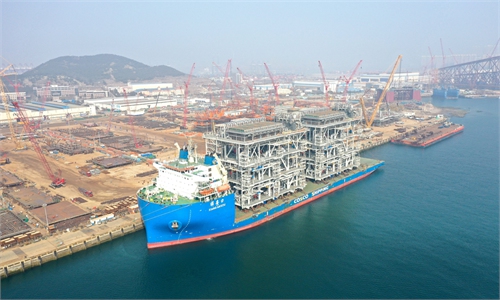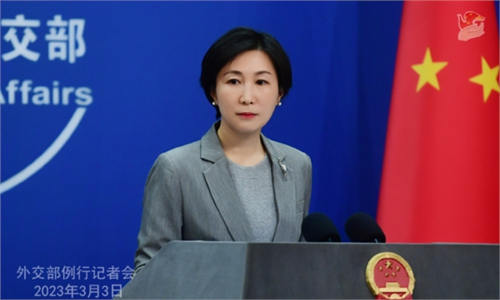Ottawa needs more than verbal clarification to restore Chinese investors’ confidence

Illustration: Xia Qing/Global Times
Canada will not force Chinese state-investors in three of its large mining companies - Teck Resources, Ivanhoe Mines Limited and First Quantum Minerals Limited - to divest stakes, as such a move would create policy uncertainty, the country's Natural Resources Minister Jonathan Wilkinson said, according to Reuters. This is the first time Canadian government officials have clarified what the future holds for other Chinese investments in the three Canadian mining companies, according to the report.The Canadian government's clarification of "not forcing Chinese state investors to divest stakes" is a positive sign, as this at least clears investment perspective in the country to a certain extent. Nevertheless, if Canada really has sincerity to dispel Chinese investors' doubts, verbal clarification is clearly not enough.
Citing the guise of so-called national security, Ottawa last November asked three Chinese companies to sell their stakes in Toronto-listed lithium explorers, drawing criticism from the mining industry and raising questions about the future of other Chinese investments in the Canadian mining sector.
Although Canadian officials provided clarification several months later, the impact and damage of this unreasonable political interference in the normal and legal investment of Chinese companies has already had an irreversible effect.
Chengxin Lithium Group Co, one of the three Chinese companies that were asked to sell stakes of Canadian companies in November, said on Thursday that the company sold all of its shares of the Canadian company at Ottawa's request. At present, the company has no project in Canada. If it plans to invest in Canada in the future, it will definitely consider risks, including the Canadian government's restrictions on Chinese companies on "security grounds." Judging from the attitude of the Chinese company, it still has great doubts about Canadian policies. It will not be easy for Canada to restore Chinese investors' confidence at one stroke.
Indeed, it was extremely unwise for Canada to artificially obstruct normal economic, trade and investment cooperation between Chinese and Canadian companies. If the Canadian side's clarification means that more correction measures will be taken and the political interference in legitimate investment of Chinese companies will be removed, it will help boost bilateral trade and investment. Or else, Wilkinson's statement is meaningless.
If Canada decides to follow the call of domestic companies, sincerely restore the confidence of Chinese investors, and clear their investment prospects, it must at least stop the unreasonable suppression and provide fair and non-discriminatory business environment for Chinese companies. The country should take concrete actions to uphold the market economy principles and international economic and trade rules as it claims.
Restoring the confidence of Chinese investors is beneficial to Canada's economy. At a time when economies across the world are facing uncertainty over the impact of geopolitical conflicts on energy and other fields, more pragmatic moves will help promote China-Canada economic and trade exchanges, thereby promoting the acceleration of the Canadian economic recovery.
Take the lithium mining industry as an example. The important industry related to the booming new-energy vehicle industry represents great opportunities for China and Canada to deepen economic and trade cooperation. Previously, the Canadian government has interfered with supply chain cooperation formed by enterprises. If Canada can follow this development trend in the future and not engage in political interference, it will promote global cooperation in this field and accelerate growth.
Admittedly, China-Canada relations face challenges posed by ongoing US interference. As the US has been moving against economic laws and promoting economic and trade "decoupling," it is deliberately trying to push economies joining a US-led camp against China. But it is obviously unrealistic for Canada to follow the US to "decouple" from the world's second largest economy and manufacturing hub. Therefore, Canada should maintain policy independence when it comes to economic, trade and investment issues with China.
As an economy that relies heavily on foreign trade, Canada needs to make a choice that is in line with its own interests. In the post-pandemic era, the space for practical cooperation between China and Canada will be even broader. Canada's exports to China only account for 4 percent of its overall foreign exports now. According to Chinese customs data, Canadian exports to China surged 61 percent in the first two months of this year. Hopefully Canada can take advantage of this momentum. Taking more pragmatic measures to correct the unreasonable suppression of Chinese companies in a timely manner will be an important starting step on the right direction.
The author is a reporter with the Global Times. bizopinion@globaltimes.com.cn



